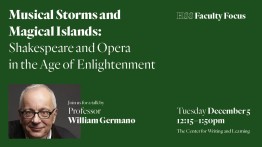Musical Storms and Magical Islands: Shakespeare and Opera in the Age of Enlightenment
Tuesday, December 5, 2023, 12:15 - 1:50pm

How did Shakespeare’s wordy, complicated, highly poetic plays become a source for opera? What was lost? What gained? And what does translation have to do with it?
Since the beginning of the eighteenth century, composers have mined Shakespeare’s plays for musical purposes—and almost always in languages other than English. Among famous operas based on Shakespeare are such repertory staples as Gounod’s Roméo et Juliette, Britten’s A Midsummer Night’s Dream, and Verdi’s three: Macbeth, Otello, and Falstaff. Less well known are the many adaptations of The Tempest, beginning in the age of the German Enlightenment and continuing on into our own time.
As part of a series of talks by HSS faculty, William Germano, professor of English, looks at operatic adaptations of The Tempest in order to think about the deformations inherent in musical adaptation and opera’s role in creating the concept of a “global Shakespeare.”
The talk will be held in The Center for Writing and Learning in the library.
Located at 7 East 7th Street, between Third and Fourth Avenues




